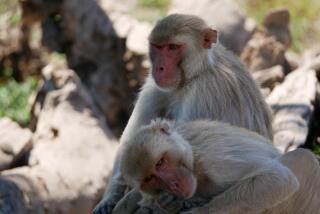Chimpanzees will kill to conquer territory, study finds
Chimpanzees are willing to attack and kill chimps from neighboring groups in an effort to expand their territory, according to scientists who have studied a primate colony in Uganda for 10 years.
The chimp behavior could shed light on the evolutionary roots of human cooperation, the researchers said in a study published online Monday in the journal Current Biology. Other experts said it could help explain the origins of human warfare.
Primatologists have long known that chimpanzees band together in single-file lines to silently patrol the border between two communities. If they come across an unfamiliar male, they will attack him with their teeth, take turns jumping on his body and pull off his testicles. If they encounter an unfamiliar female with a baby, they will rip it out of her hands and kill it, sometimes cannibalizing the infant.
“It’s dramatic,” said Sylvia Amsler, a biological anthropologist at the University of Arkansas at Little Rock who worked on the study.
What Amsler and her colleagues did not know was why the chimps — which along with bonobos are humans’ closest living relatives — engaged in this behavior. Some researchers proposed that the attacks were designed to attract females to a colony. Others theorized that contact with scientists had caused once-peaceful chimpanzee communities to become warlike.
Scientists did know that chimpanzees benefit when their territory increases, Amsler said. For instance, females are able to give birth more frequently when they have more resources at their disposal.
To determine whether the killings were related to resources, the researchers tracked chimps in a large and prosperous community of about 150 animals (the average colony contains 30 to 80 chimps, Amsler said). Over the course of a decade, the scientists mapped the paths of the patrols as well as where the killings occurred.
The researchers observed 18 killings and found evidence of at least three others — far more attacks than had been witnessed in other chimp colonies. Most of the victims were infants, probably because they were easier to kill, Amsler said.
Between 1999 and 2008, the majority of the patrols and killings took place on the northeast corner of the chimps’ territory, which spanned about 11 square miles.
Then in 2009, after a particularly good fruit crop, members of the colony — males, females and infants — suddenly moved into the piece of land where the patrols and killings had been concentrated, adding 2.5 square miles to their domain.
The study supports the view that chimpanzees are competing for territory, said Michael Wilson, a primatologist at the University of Minnesota, who wasn’t involved with the study. Such observations, he said, could help scientists figure out whether warfare could have predated the development of weapons, agriculture and ideology, which “some people in anthropology argue are the cause of war.”
Amsler, however, said the findings could be more useful for understanding the evolution of cooperation among primates, including humans.
“Maybe the fact that we evolved, such cooperation did in fact come from needing to be successful in competition between groups,” she said.







